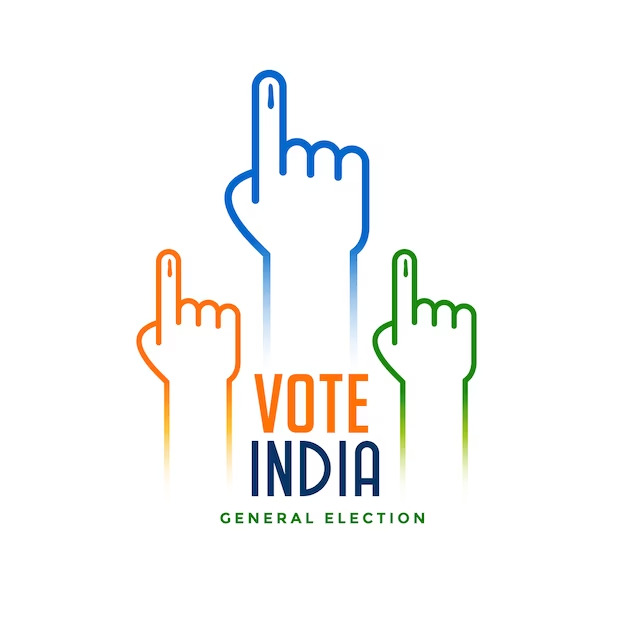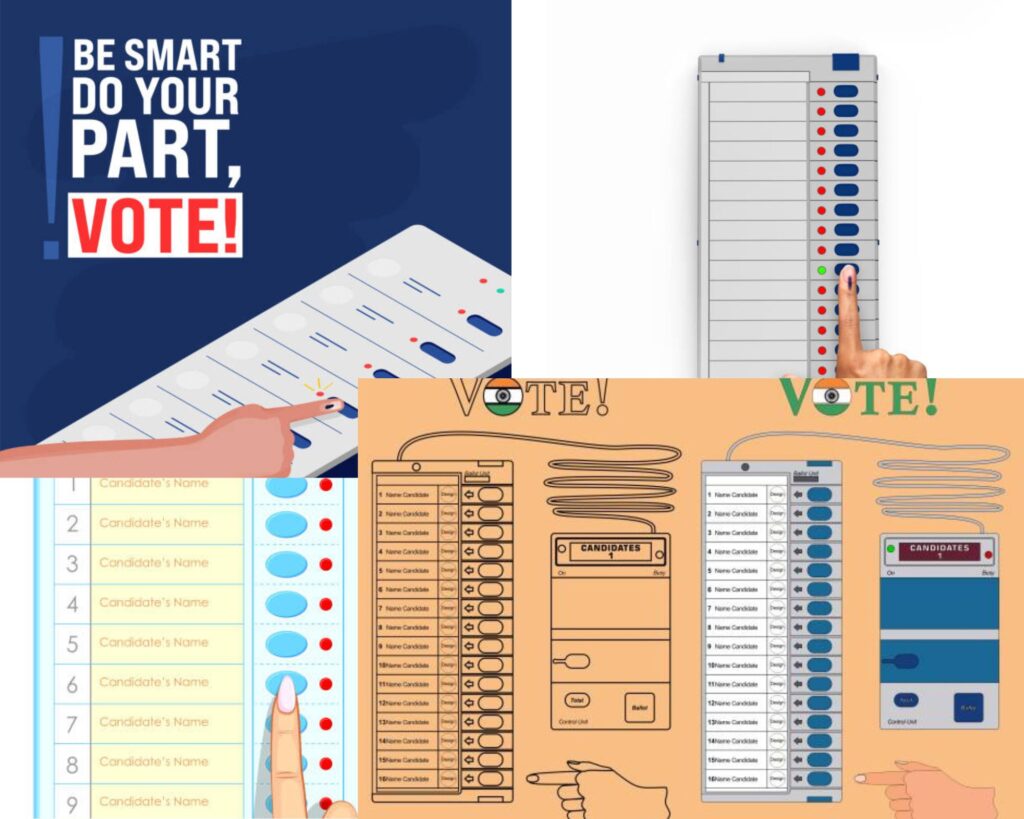
Table of Contents
General Elections in India 2024
The General Elections in India 2024 are expected to be held in India between April to May 2024 to elect the members of the 18th Lok Sabha. India, being world’s largest democracy, has vibrant history of elections that reflects its democratic ethos. The journey of Indian elections is an awe-inspiring tale of struggle, sacrifice, and progress. Let us discuss the journey of election system in this blog;

Pre-Independence Era
Long before India gained independence from British colonial rule, seeds of democratic representation were sown.
- First general elections were held in British India in 1920. They were held to elect members to Imperial Legislative council (which was succeeded by Constituent assembly in 1946). However, there was limited participation for Indians in decision-making process.
- The General election in 1934 marked the first year in which Indian women (not all women, but few) were eligible to vote in any but a local election. Indian National Congress emerged as largest party in this election.
- As per the provisions of Government of India Act, 1935, the elections were held in eleven Indian provinces in 1937. The qualification of citizen for the voting is variable in different provinces, but franchise was limited one and depend mainly on the factors as taxation, property, literacy and community etc. That means, only small portion of the society had the right to vote. Specifically only 14% (as per Report of ECI on the First General Elections in India 1951-52, Vol-1 & https://eci.gov.in/files/file/10971-12-state-wise-voters-turn-out/).
Post-Independence
With the dawn of independence in 1947, the framers of India’s constitution realized the significance of democratic principles in shaping the nation’s future.
25th January 1950 is the date on which the Election Commission of India was established to conduct free and fair elections.

Universal Adult Franchise
India’s most remarkable achievement came with the adoption of universal adult suffrage in its very first general elections in 1951-1952. Regardless of gender, caste, religion, or socioeconomic status, every Indian citizen above the age of 18 gained the right to vote. (Earlier age limit was 21, later changed it to 18 years following 61st Constitutional amendment 1988). This decision brought inclusiveness and brought all people on same platform in this diverse nation.

Challenges
Conducting elections in a country as vast and diverse as India posed numerous challenges. Following the independence years, nation was lack of resources. The infrastructure was not adequate to reach remote regions and ensuring the safety of voters was one of the key challenge.
Despite these obstacles, India succeeded in conducting periodic elections, reinforcing its commitment to democratic values.
First of its General Elections were held in 1951-52 for Lok Sabha in which more than 170 million voters voted (source: Wikipedia), elections to most of the state legislatures took place simultaneously. In 2024, India is expected to be conducting 18th Lok Sabha elections after independence.

Milestones
Reducing voting age from 21 to 18 years to accommodate young people in this democratic process was revolutionary decision. This was done by amending the constitution in 1988 (61st Constitutional amendment act, 1988)
For enhancing efficiency and transparency, (EVMs) Electronic Voting Machines were introduced by ECI first time in 1982 in Kerala state. Since General Election in 2004, the usage of EVM expanded all over India. Later on, the adoption of (VVPAT) Voter-Verified Paper Audit Trail further strengthened voter confidence in the electoral process.


Political Parties and Alliances
Being largest democracy in the world, framers of constitution adopted multi party system. The evolution of political parties played a crucial role in shaping the Indian electoral landscape. Pre-poll and post-poll alliances have become significant factors in forming governments, reflecting the diversity of India’s political arena.
Electoral Reforms
Recognizing the need for continuous improvement, Election Commission of India has undertaken several electoral reforms time to time.
These reforms have aimed to address issues like corruption, criminalization of politics, electoral offenses, lack of infrastructure by introducing features like postal ballots for certain class of people, NOTA option, electoral bonds etc. Each step forward has strengthened the foundations of India’s democracy.

Voter Turnout and Participation
Voter turnout is a vital indicator of the health of any democracy. India has seen fluctuations in voter participation over the years. Recent Lok Sabha election in 2019, found voter turnout as 67.40% (as per Report of ECI on the First General Elections in India 1951-52, Vol-1 & https://eci.gov.in/files/file/10971-12-state-wise-voters-turn-out/). Over the years efforts made to encourage voter registration and turnout through various initiatives and awareness campaigns.
Conclusion
The history of Indian elections is an evidence to dedication of its people towards upholding democratic values. From the struggle for independence to the establishment of a robust electoral framework, India’s democratic journey continues to inspire the world. As citizens exercise their right to vote, they not only shape the nation’s future but also strengthen the pillars of democracy for generations to come.
FAQs
Q1: What are the different types of elections held in India?
A1: a. General Elections: For the Lok Sabha (House of the People).
b. State Legislative Assembly Elections: For the respective state assemblies.
c. Local Body Elections: For municipal corporations, panchayats, and other local bodies.
Q2: What is the Election Commission of India (ECI)?
A2: The ECI is an autonomous constitutional authority responsible for conducting elections in India, ensuring fairness and adherence to election laws.
Q3: How often are General Elections held in India?
A3: General Elections are held every five years to elect members to the Lok Sabha, the lower house of Parliament.
Q4: How are members elected to the Lok Sabha?
A4: Members of the Lok Sabha are elected through a system of direct adult suffrage, using a first-past-the-post electoral system.
Q5: What is the significance of the “Election Symbol” in India?
A5: Election symbols help political parties establish their identity on the ballot paper, making it easier for voters to recognize and choose their preferred party.
Q6: How are State Legislative Assembly Elections conducted?
A6: State Assembly Elections are held using similar principles as General Elections. Each state has its own assembly, and elections are conducted to elect members to these assemblies.
Q7: What is the “Model Code of Conduct” during elections?
A7: The Model Code of Conduct is a set of guidelines issued by the ECI to ensure that political parties and candidates maintain a fair and ethical campaigning environment.
Q8: How is the Chief Election Commissioner (CEC) appointed?
A8: The Chief Election Commissioner is appointed by the President of India. The CEC is usually the senior-most member of the Election Commission.
Q9: Can Non-Resident Indians (NRIs) vote in Indian elections?
A9: Currently, NRIs are not eligible to vote in Indian elections unless they are physically present in their respective constituencies on polling day.
Q10: What is NOTA?
A10: NOTA stands for “None of the Above.” It allows voters to reject all candidates if they do not find any of them suitable.
If you are interested in reading Tech Blogs, then you can follow the links below:
1. Future of Electric Vehicles in India: Accelerating Towards Sustainable Mobility
2.From Dreams to Reality: How Hydrogen Fuel Cars are Shaping the Future of Transportation in India

7 thoughts on “General Elections in India 2024: Know Some Interesting Facts About Indian Elections!”